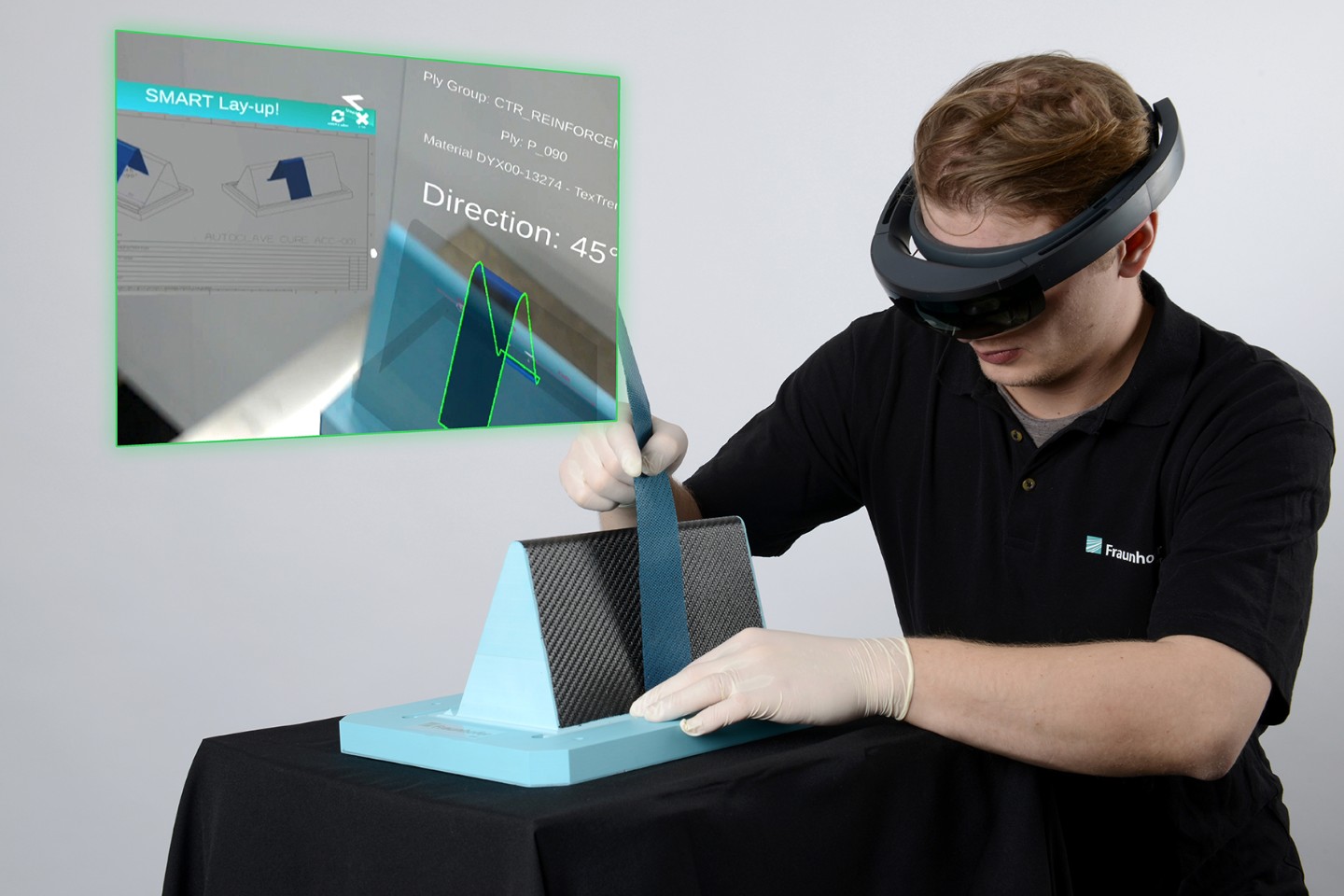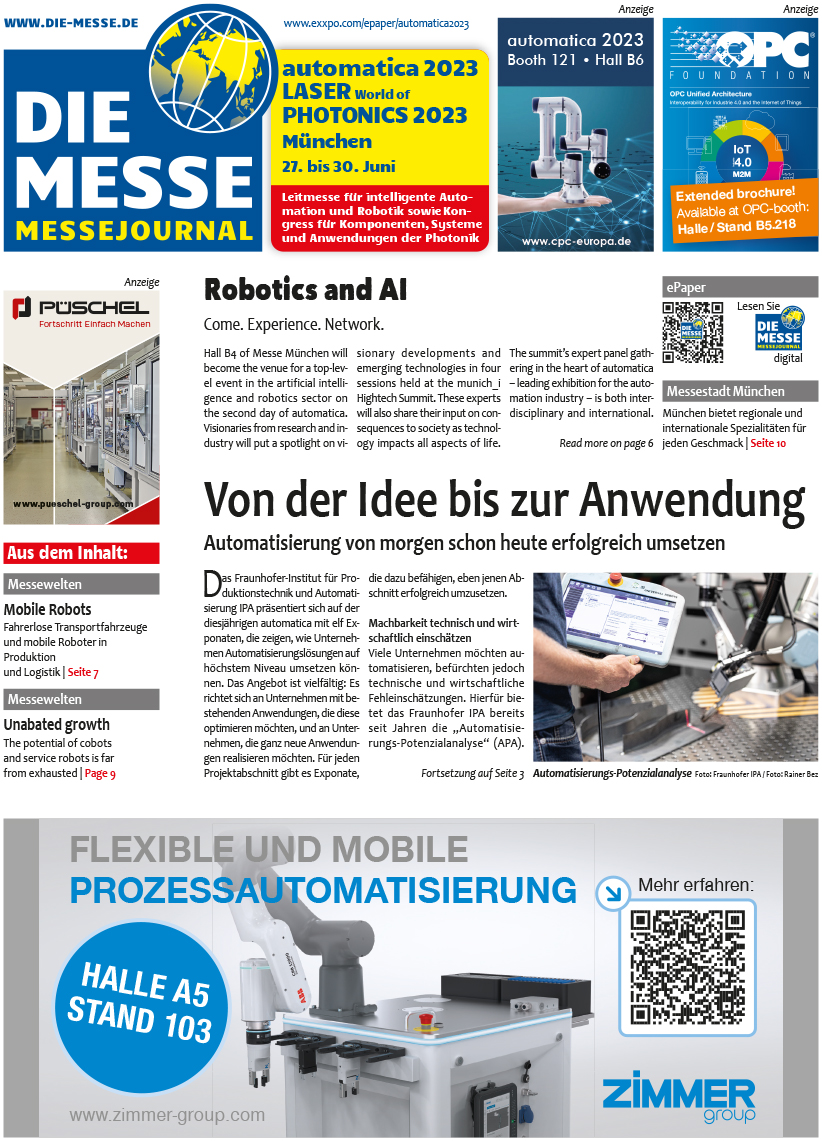Augmented reality system facilitates manual manufacturing of products made of fiber-reinforced composite materials
The manufacturing of products made of fiber-reinforced plastics (FRP) often still involves a number of manual work steps: the position and orientation of the semi-finished fiber-reinforced materials must be aligned precisely by hand to ensure that the product has the required levels of stability and flexibility after lamination and curing. Ultimately, this is the only way of enabling the user to fully exploit the advantages of the FRP material. To support the manual deposition process, known as preforming, the Fraunhofer Institute for Production Technology IPT in Aachen, Germany, has developed intuitive software for commercially available augmented reality glasses: The system specifies the correct deposition of the semi-finished materials as a virtual representation on the mold and can thus significantly improve the quality and performance of FRP production processes.
 Foto: Fraunhofer IPT Foto: Fraunhofer IPTThe Fraunhofer IPT has developed software for commercially available smart glasses that specifies the correct deposition of the semi-finished materials as a virtual representation on the mold. |
Digital instructions and documentation directly on the component
The Fraunhofer IPT has developed an alternative to these two working aids as part of the Fraunhofer "Smart-Lay-Up!" project: Augmented reality software that uses commercially available smart glasses to make the exact alignment and positioning of the semi-finished materials directly visible on the component. The cutting of the semi-finished materials is also supported by projection of target contours. This cost-effective system is much more flexible in terms of handling than conventional procedures using paper or laser-based projection systems and is also fully scalable in the production environment, making it suitable for the serial production of FRP products.
The application developed by the Fraunhofer IPT provides the worker wearing the smart glasses with much more than just a digital version of the plybook: it also offers an augmented reality environment in which the information for aligning the fiber layers or pre-impregnated fiber prepregs is placed directly above the component in front of them. Step-by-step instructions guide the worker through the preforming process and, if required, document the work for quality assurance purposes.
The software can be easily installed as an app on data glasses with an Android operating system and can be adapted for the lay-up task in hand. Companies wishing to try out and use the technology can now test the app in a feasibility study with their own production staff and identify individual requirements in collaboration with Fraunhofer IPT employees.
Cost-effective system for manufacturers of individual lightweight products
The Aachen researchers predict that the new technology will improve the accuracy and traceability of the processing of components made of fiber-reinforced high-performance materials, reduce the error rate and significantly shorten process times. The acquisition of the smart glasses-based system, which costs less than a tenth of the costly laser projection systems, will thus also become affordable for small and medium-sized companies and can lead to noticeable productivity improvements in markets such as medical technology, boat building, mechanical engineering, but also in the manufacture of upmarket consumer products made of fiber-reinforced lightweight materials.
Further information: https://www.ipt.fraunhofer.de/en.html
More news about "AUTOMATICA":
29 September 2020
automatica 2020 not to be held as in-person event – new format for 2021 under development
The automatica exhibition scheduled for December 8–11, 2020 will not take place due to the current travel restrictions in Europe in connection with the coronavirus pandemic, which are becoming more stringent. This decision has been taken by Messe München in agreement and close coordination with the conceptual sponsor VDMA Robotics + Automation and the automatica Advisory Board. In coordination with the industry, Messe München is now developing a compact new in-person event for mid-2021, which will be adapted to the specific circumstances in times of the coronavirus. In addition, auto-matica is further expanding its digital offering. (more…)15 April 2020
automatica is postponed – new date in December 2020
Due to the increasing global spread of Coronavirus (SARS-CoV-2) and based on the recommendations of the German Federal Government and the Bavarian State Government, Messe München feels compelled to postpone automatica 2020. This measure has been taken in consultation with the VDMA Robotics + Automation Association as conceptual sponsor and in responsibility for the health of exhibitors and visitors. automatica 2020 will instead take place from December 8 to 11, 2020. (more…)23 March 2018
automatica 2018: Assembly and Handling Technology
Industry 4.0 and digital networking are fundamentally changing assembly processes. The dimension of this development will be visible for the first time at automatica 2018 on the grounds of Messe München from June 19 to 22. (more…)3 November 2017
Robot automatically identifies weeds
Those who want a rich harvest need to drive back weeds so that the crops can grow better. In organic agriculture, herbicides are ruled out as they are considered toxic chemicals, and unwanted plants must be laboriously weeded out. This time-consuming work can soon be taken care of by robots. (more…)6 September 2016
Automatica exceeded expectations
With around 45,000 visitors (plus 30 per cent) and 839 exhibitors from 47 countries (plus 16 per cent), Automatica 2016 (June 21 to 24) exceeded all expectations. (more…)
| FAIR NAVIGATOR AUTOMATION | |
|---|---|
|
| E-PAPER AUTOMATICA |
 |
